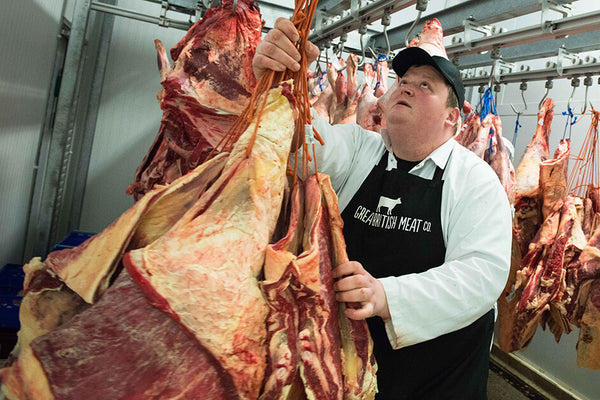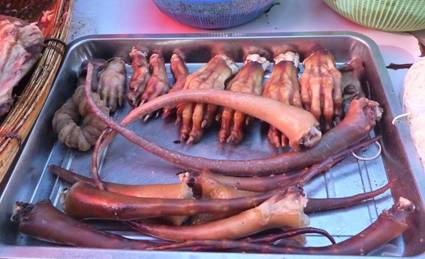2019-01-27 at 4:19 PM UTC
Originally posted by cupocheer
Infin – if I whisper an instruction into a dyke's ear would the stud of a doorway support the crawlspace?
only if you use lubricant
The following users say it would be alright if the author of this
post didn't die in a fire!
2019-01-27 at 4:21 PM UTC
 https://greatbritishmeat.com/blogs/butchers-blog/hanging-meat
https://greatbritishmeat.com/blogs/butchers-blog/hanging-meat
Originally posted by infinityshock tore off lanny the trannys granny panties to give him a whammy in his faggy saggy fanny, made him say 'spankkk me daddy' and gave him to a nappy picaninny to be his cock jockey
Hanging meat is really important to the quality of meat, and is the first stage of good butchery. So what is hanging and why is it important for meat?
Why is Hanging Meat good
Hanging is the process of aging or maturing meat by hanging the carcass (or part of it) from a hook. It is usually done in a temperature controlled room, with good air flow. At the butchery we have a walk-in aging room, which is basically a big fridge with a massive fan.
During hanging, the enzymes in the meat make the fibres of the muscles softer and more elastic, which ultimately leads to the meat becoming relaxed and tender. In reality the aging process is also the start of decomposition, but it is absolutely nothing to worry about, as when kept in the right conditions and temperature by the butcher, actual decay that will taint the meat will not happen for weeks, or even months.
Meat also loses moisture as it hangs, which is a good thing when it comes to cooking. Young meat, that is wet and underhung carries too much water in it, which ends up either in your pan or tray during cooking or on your carving board when you cut it. Basically the moisture expands during cooking and leaches out through the stretched fibres of the meat. Oddly this means that ‘wet meat’ actually ends up drier after cooking. Nicely hung-meat is tastier and more tender than unhung meat, it is that simple.
Not all meat hangs the same way, and there are some limits that a butcher needs to observe. Almost all meat will benefit from a few days hanging in a fridge to relax and settle the muscles, and allow the fat to solidify (as it’s pretty much liquid in a live animal). Meats without marbling or good fat covering, do not stand up to lengthy hanging times, as they are not protected from deterioration by the fat. Pork, veal and young lamb fall into this category, but we still give them four to six days hanging to allow flavours to develop safely.
It’s also worth adding that if you intend to freeze meat, you really should get some aged meat. Once again water and moisture are the reason, as the expansion of water in wet meat expands as it freezes meaning ice crystals will tear and push apart the fibres of the meat. Meat that has been properly hung will have less moisture, and will contain more elastic fibres that are better suited to cope with expanding ice crystals. This will mean when you defrost the meat and then cook it, less water will leach out compared to wet meat.
Easily the biggest reason for buying meat from a butcher compared to a big retailer or supermarket, is that the meat is unlikely to be hung properly. Even putting welfare and provenance aside, a supermarket doesn’t hang meat as it leads to weight loss which in turn leads to money (quite literally) going down the drain. A side of beef will looses 15-20% through ‘drip loss’ during the ageing process, and weight is money for the big retailers. There are lots of horror stories of mis-practise where abattoirs are told to hose carcasses regularly to retain moisture and weight.
So there you have it. Hanging meat is the first, and probably the most important stage of good butchery. It is really important to the quality of meat, and is possibly the main reason to buy from a butcher. We hope you’ve learned something new reading this, and it has made you think about where your food comes from.
The following users say it would be alright if the author of this
post didn't die in a fire!
2019-01-27 at 4:23 PM UTC
The following users say it would be alright if the author of this
post didn't die in a fire!
2019-01-27 at 4:25 PM UTC
https://chinadialogue-production.s3.amazonaws.com/uploads/content/image/7099/main_dogmeatmain.jpg
Originally posted by Zanick
For most people living in the first world, there is no good, rational defense to continue supporting the holocaust of animals. Discuss.

The following users say it would be alright if the author of this
post didn't die in a fire!
2019-01-27 at 4:26 PM UTC
Originally posted by Zanick
Cheetahs and panthers and tigers and wolves don't have the capacity for moral decisionmaking. If you tried to teach them about utilitarian ethics and how they can be applied to the animals they kill and eat, they would probably kill and eat you. Humans have ethical reasoning, and most of us embrace some kind of personal imperative not to needlessly harm others. Therefore, it is logical that a human being which concerns itself with the moral dilemma of whether or not to eat animals can resolve this problem by abstaining from eating animals. This is the essence of the moral argument, and I think this much is essential for someone defending the vegetarian side of this debate. There are those who invoke various arguments from religious canon, twisting them around to generate reasons why this faith or that abhors killing, but we need only a secular version of this to draw a fairly tight argument against the killing of animals.
So we are not obligated to kill by our status as apex predator - the same conditions by which we dominate other beings also grants us the opportunity to save them. Nowhere is it written that a being which can kill, should.

The following users say it would be alright if the author of this
post didn't die in a fire!




 The following users say it would be alright if the author of this post didn't die in a fire!
The following users say it would be alright if the author of this post didn't die in a fire! The following users say it would be alright if the author of this post didn't die in a fire!
The following users say it would be alright if the author of this post didn't die in a fire!



